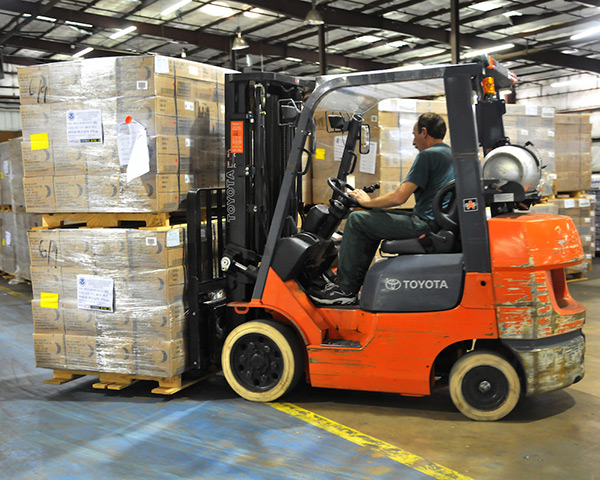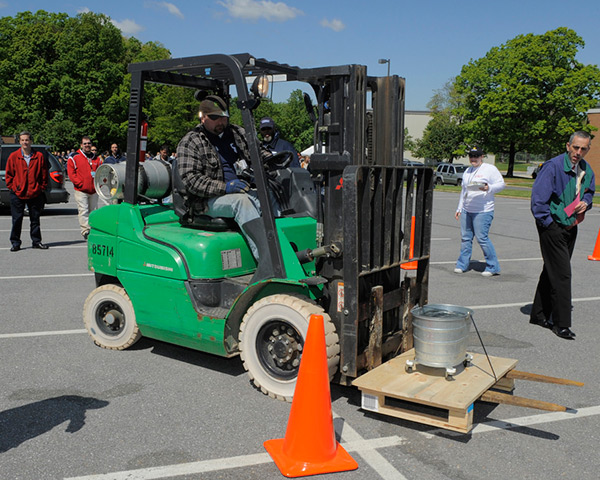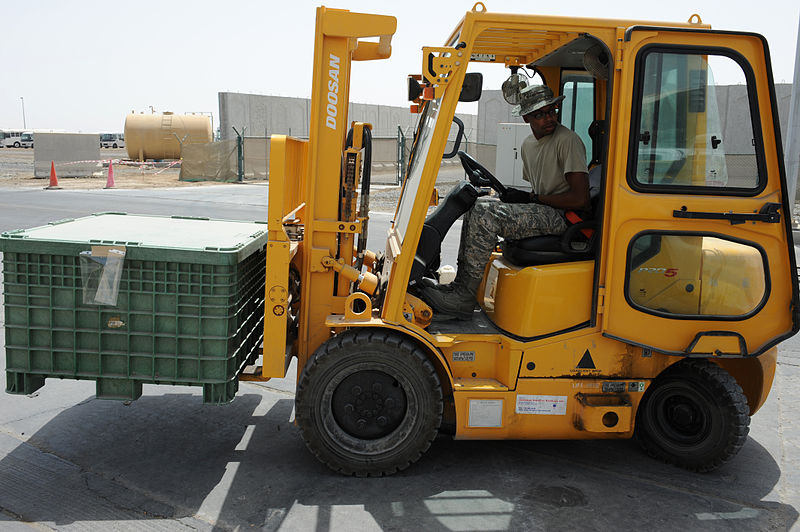Forklift Operator Training Overview
Forklift operators are professional building experts who specialize in using a forklift to perform heavy-duty work. Forklift training can be one of the most important aspects to becoming a certified forklift operator. According to PayScale.com ,entry-level operators earn an average wage of $13 per hour, and after a few years, many are making about $15 per hour. In addition, forklift operator experts can earn closer to $20 per hour, making this line of work a competitive option for individuals considering skilled trade work.
Training to become a forklift operator is typically extensive, particularly in regards to safetyand technical skills. OSHA guidelines mandate that you must be at least 18 years old to get a forklift operator position, and while higher education isn’t necessarily required to this job, most forklift operator positions will require a minimum of a GED or high school diploma. OSHA certifications for handling toxic chemicals and other dangerous items are typically needed, as is an appropriate state license.

Generally speaking, most forklift operators start out in a lower-level position, such as in a warehouse moving small and safe items. After getting a few years of experience, they can apply to more complicated positions that pay more money. For some, this eventually leads to promotion to management and supervisor positions where a combination of technical and management skills are applied.
With proper training and field experience, being a forklift operator offers a competitive and accessible job opportunity for individuals looking to work in heavy machinery operation.
Forklift Operator Training and Educational Requirements
Formal education is not necessarily required for a forklift operator career. In fact, post-secondary education is not necessary at all. Employers typically offer training programs as a way of providing their operators with the skills they need to work safely. Independent training programs are also available, though you will have to invest your money to get licensing in these instances.
It should take no more than a few weeks to receive a forklift operator license. After receipt of this license, it is important to get certification from OSHA. This certification process ensures that you can be employed in more dangerous situations and therefore make more money. Without a license, you may not be able to operate a forklift in many states.
The biggest component of a forklift operator’s education is on-the-job training. In this way, they will master their skills while learning the needs of their employer. Licenses typically last several years and must be renewed with updated training. Training focuses heavily on properly operating a forklift, safely moving the forklift, spotting dangerous items, and emergency procedures in case of accidents. For more information on training, please see our Guide on Forklift Safety.
Certifications
OSHA must certify all forklift operators before they can start working. This safety group requires that you take an exam to get certified as a trained and safe forklift operator. Typically, you attend a short training program with OSHA officials. After this program, you will receive a quick and straightforward review. This test will allow you to get started as a forklift operator. It also helps guide you towards safer forklift operation.
OSHA provides certification exams that must be taken and passed before you are certified. Details on the cost and format of the exams can be found on the OSHA website here: https://www.osha.gov/. Thankfully, you can take practice tests before your exam to ensure you pass. These practice tests are usually provided by your employer or even training experts.
Licensing
Forklift operators also need to receive a state-issued license beyond their OSHA certification. You can learn more about the requirements for your particular state by visiting your state’s Department of Labor website or office. The training courses offered for forklift operators are designed to cover the essential licensing necessities required by the state.

The training courses offered for forklift operators are designed to cover the essential licensing necessities required by the state. For example, it helps drivers understand what items are dangerous to handle. It also helps them know how to deal with them carefully.
Typical examination topics for this OSHA exam include gauging a driver’s familiarity with truck controls, their ability to signal when turning, proper intersection etiquette, obeying signs, yielding to pedestrians, loading properly, unloading, and much more. Talk to the licensing board of your state or city to get a better feel for what is required here.
As mentioned above, you need to get your licensed renewed every few years. The exact amount of time required will vary by the state. For example, some may let you go as long as five years without getting your license renewed. Again, it is important to talk to local authorities to get a better idea of what is expected of you in this situation.
Job Outlook
According to the Bureau for Labor Statistics, the job outlook for forklift operators is slower than average. As of 2014, there are about 680,000 forklift operator positions in the country. In the same year, it was projected that growth in the field would be at about three percent over the next 10 years. That projects out to about 20,400 jobs in the coming decade or 2,040 per year.
The factors that affect growth in this industry can be hard to understand. Forklift operators are in demand, but if manufacturing or storage businesses start slowing down, there’s a good chance the demand will decrease. The economic strength of the industrial market is also highly tied into this position. As this market is projected to remain steady, forklift operator demand is likely to remain consistent.
The sectors that typically require this type of job are manufacturing and industry. Manufacturers always need forklift operators to move their goods and store them properly. For example, a manufacturer of soda needs forklifts to place drink containers in their trucks. On the same note, the industrial sector requires forklift operators to haul cumbersome and dangerous equipment.
It is fair to say that there will always be a demand for forklift operators. That said, it is also highly unlikely that the market will go much over the current needs. It isn’t a job that suffers from a high turnover or chaotic changes in outlook or demand. In that way, it is a very reliable and dependable job for somebody who is interested in it.
Job Overview
The average day of the forklift operator is pretty simple. About 95 percent of the time they will be operating their forklift to haul items. These duties include receiving orders of what needs to be moved, finding out where they are located, and noting where they must be moved. The forklift operator will then find the items, load them on the forklift, and haul them to their new location.

Fulfilling these duties requires understanding the layout of the storage area and knowing how to get there quickly. It also requires the strength to climb on a tracking system (if necessary) to find the product. Other requirements include wrapping the item, carefully positioning it on the forklift, ensuring it is well balanced, tying it down, and unloading it at the proper location.
Beyond primary duties, many forklift operators are required to clean up items in the storage area and lift loose or stray products. Depending on the item they are cleaning or lifting, they may need to throw them away or store them in the proper area. These duties take up about five percent of their work day. They are typically very light compared to their main work.
The job requires a certain level of stamina and physical fitness. Forklift operators need to be robust enough to climb, stand for extended periods, walk when necessary, bend to wrap items they are moving, crouch to tie ropes and other attaching lines, and sit for extended periods in a forklift.
Stamina and concentration are also absolute necessities for this position. Those who have trouble with concentration are likely to make mistakes that could be costly. Good hand-eye coordination is also a must. For example, a good forklift operator must be able to handle all the controls in his cabin without difficulty.
A good forklift operator is also a strong communicator with a knack for detail. A forklift operator must be able to memorize the layout and floor plan of a building. Additionally, a successful operator must be willing to take directions without arguing with their superiors, while also being prepared to learn new skills and take the initiative when necessary. Independence can be crucial in certain forklift operations.
Forklift operators typically belong to a union, though this isn’t always necessary. A strong union can help protect their job, wages, benefits and more. While it is possible to get hired without joining a union, co-workers may strongly urge you to become a member.
As a result of the strong forklift operator unions in the country, you will usually work no more than 40 hours. Overtime pay is possible when you work over those hours. According to Payscale, overtime pay will typically be about 1.5 times your average pay. For example, if you make $15 an hour, you would make $22.5 per hour when working overtime.
Hazards will vary depending on your exact position. For example, a forklift operator working in a chemical factory could find themselves in danger if they drop the chemicals they are moving. In some instances, it may be possible to suffer from injuries caused by items falling on you from storage areas.
Other hazards include accidents caused by fatigue or lack of concentration and physical injuries caused by overexertion. Thankfully, forklift operators have a reasonably safe position and rarely suffer from serious injuries.